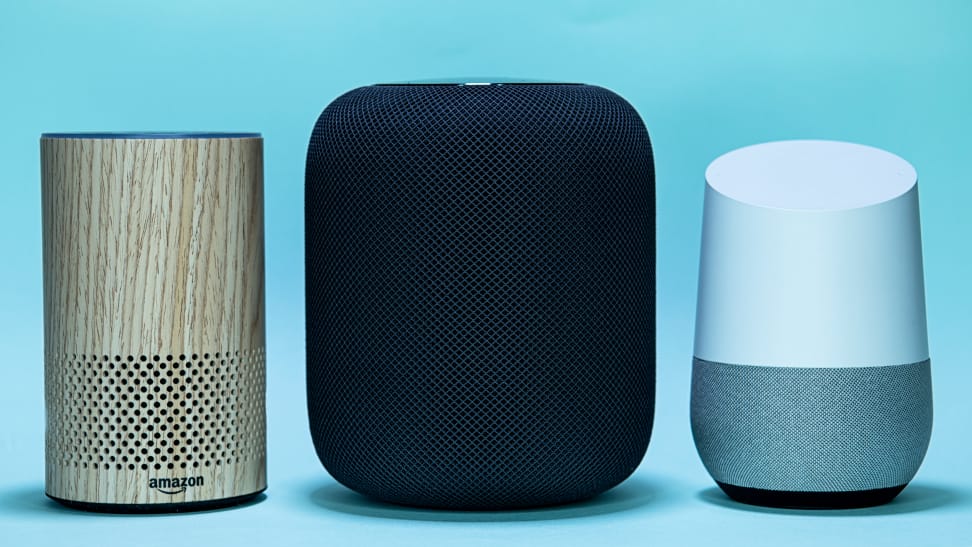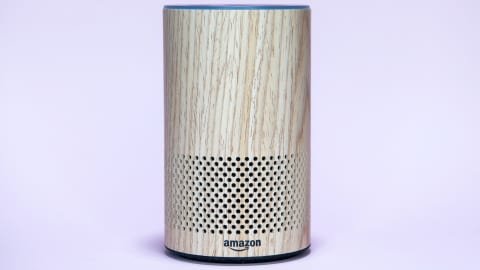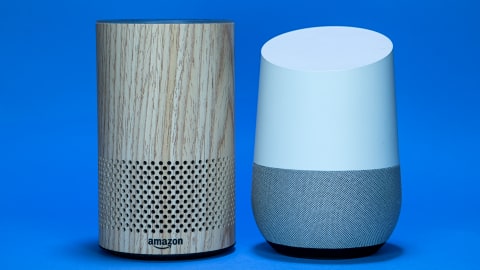Amazon Echo vs Google Home vs Apple HomePod: Which is right for you? There's a smart speaker for everyone

clicking one of our links, we may earn a small share of the revenue. Our picks and opinions are independent from any business incentives.
You've no doubt heard the buzz about smart speakers. Why else would you be reading this article? A few years ago, if you wanted a smart speaker with a hands-free digital assistant, there was only one option. The Amazon Echo was one-of-a-kind when it debuted in November 2014, and it launched into uncharted waters unsure if it would find a home with consumers.
But it was a smash hit, and was quickly followed up by the Google Home and a slew of third-party devices with Alexa or Google Assistant built in. Even Apple finally joined the party with the HomePod in early February.
Amazon Echo and Google Home Smart Speakers
Credit: Reviewed / Jackson Ruckar
Amazon and Google really cornered the smart speaker market.
Now, if you want to buy a smart speaker, you've got to choose which is the right one for you and your home. The best option will depend a lot on how you plan to use your smart speaker, and each has its own strengths and weaknesses. For instance, someone with a lot of smart devices may want the speaker that is compatible with the most smart gadgets. On the other hand, if you primarily want to listen to music hands-free or use your smart speaker as a virtual assistant, you may be better off with different options.
I have used all of these devices both in the office and at my apartment to really understand the strengths and weaknesses of each. Believe me—not one of them is perfect (yet). So it really does make a difference which one you choose to bring in to your home.

Amazon Echo
Amazon Echo 2nd Gen Smart Speaker
Credit: Reviewed / Jackson Ruckar
Price: $99.99
The Amazon Echo was the first of its kind. And now it boasts the largest lineup of smart speaker options, including the only smart speakers with display screens. Having been on the market for nearly four years, the Echo boasts a highly intelligent smart assistant: Alexa. Interacting with Alexa is pretty intuitive, as she understands most direct questions. Plus, if you're a Prime member, you can ask Alexa to make purchases or simply add items to a dedicated shopping list for review later on.
The Amazon Echo lineup—which consists of the Echo Dot ($49.99), the Echo ($99.99), the Echo Plus ($149.99), the Echo Spot ($129.99), and the Echo Show ($229.99)—can perform a host of basic functions. There are also hundreds of devices that work with Alexa, allowing you to use voice commands for smart lights, switches, robot vacuums, and other smart devices. And if you have the Spot or Show, you can even view live feeds from security cameras and video doorbells.
Amazon also rolled out calling with Alexa last year. Not only can you call anyone with an Echo or the Alexa app, but you can call actual phone numbers as well, all for free. There is even a drop-in feature that allows you to automatically connect with approved devices to check in on loved ones. This is especially great for older adults to have in their homes. (Note: this feature does not currently support emergency calling, despite rumors that Alex can call 911 for you.)
Pros: Most versatile option, works with thousands of products, affordable, hands-free calling, interchangeable shells
Cons: Speakers are not the best, Alexa can be glitchy periodically, not as customizable as the Google Home, uses Bing for search
Who should buy an Echo?
Anyone! This lineup of smart speakers is intuitive enough to use that you don't need to be tech-savvy to enjoy a large number of Alexa's capabilities. It's perfect for families with young kids as well as older adults. Amazon Prime members will benefit from making shopping lists and ordering right through Alexa. And if you have (or want) a smart home, the Echo lineup will serve you well when it comes to connecting with your devices.
